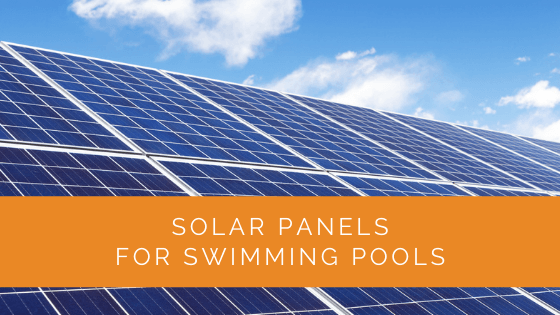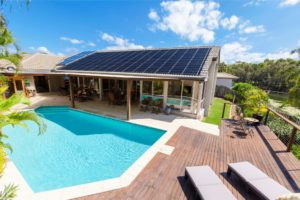Solar energy offers a compelling solution if you’re interested in reducing your energy costs and extending your swimming season. Solar technology has revolutionized how we harness the sun’s power to heat our swimming pools. Whether you’re a pool owner seeking year-round enjoyment or simply want to explore a more eco-friendly way to maintain your pool’s ideal temperature, solar thermal systems have you covered?
Across the globe, millions of households have already embraced solar energy for their electricity needs, and solar thermal heating has become an essential component for pool enthusiasts. Achieving a comfortable swimming temperature has never been more sustainable and cost-effective. In this article, we’ll explore the why and how of solar pool heating, shedding light on the benefits and workings of this innovative technology. Join us on this journey to discover the transformative world of solar pool heating.
Contents
- 1 Key Takeaways
- 2 Why Should You Use Solar Panels Near Swimming Pools
- 3 Pros and Cons Of Solar Pool Heating System
- 4 How Do Swimming Pool Solar Panels Work
- 5 Types Of Swimming Pool Solar Panel
- 6 Tips To Use Solar Panels Efficiently
- 7 Case Study: Solar Pool Heating System Installation for a Residential Pool
- 8 Expert Insights From Our Solar Panel Installers About Solar Panels For Swimming Pools
- 9 Discover the Power of Solar with Solar Panels Network
- 10 Endnotes
Key Takeaways
- Solar panels can be environmentally friendly and cost-effective to heat swimming pools, particularly in regions with sufficient sunlight. Solar pool heaters are automated and require minimal maintenance.
- The efficiency of solar pool heating systems depends on factors such as panel type, installation size, and positioning. Different solar collectors, including unglazed, glazed, individual tube, and solid panels, offer various advantages and price points.
- To maximize the efficiency of solar panels for heating swimming pools, it’s important to use pool covers, position panels south-facing and in sunny areas, choose an appropriate system size, consider heat pumps, and keep the panels clean. Professional installation and monitoring can also contribute to optimal performance.
Why Should You Use Solar Panels Near Swimming Pools
In the UK, most areas receive sufficient heat from the sun, more so in the south of the country. However, during the winter, it can get really cold, and often during the summer, the pools’ temperatures dip to 20° Celsius. As mentioned above, people generally prefer the pool’s temperature to be 28° Celsius.
So, you need a solar pool heater that has short payback periods and helps cut costs on your energy bills. These heating systems generally don’t need much controlling or monitoring as they are automatically controlled. Moreover, if you don’t have a solar panel installed, your pool’s water can get cool as it loses heat via evaporation.
Pros and Cons Of Solar Pool Heating System
To convince you why you need such panel installation near your swimming pool, here are some pros and cons of a solar thermal heating system.
Pros
- Solar heating is environmentally friendly.
- Once installed, there is little to no running costs
- Most solar pool heaters have a life expectancy of at least ten years
- Solar pool heating works well when it warms the pool water that is used to top up your swimming pool
- You’ll find swimming pool solar heating the most efficient in the summer months without requiring much maintenance
- You can use solar pool heaters in commercial and residential spaces
- The solar collectors will function even if it is cloudy conditions, as the sun’s thermal energy remains unaffected
- Solar pool heaters are easy to install
- If you are in the country’s south, you can swim in your swimming pool for all 12 months with a solar pool heater installation.
- It will maintain the temperature of your pool
Cons
- You can’t control the temperature like you would a thermostat. It depends on the sun’s position.
- Most affordable installations require direct sunlight to fall on the panel’s surface.
- An ideal ground in terms of size and position is required for installing the solar thermal system near your swimming pool.

How Do Swimming Pool Solar Panels Work
Now you know why you require these panels to heat your swimming pool. You might wonder how the panels work for a swimming pool.
Solar thermal system for your swimming pools is easy and efficient. Essentially, a solar panel system consists of four parts:
- The Collector: This is the main component of the solar heating systems. The collector is mostly installed on the roof of your property, and it contains reinforced glass pipes that capture the radiation emitted by the sun that is transferred into heat.
- A Pump: The pump circulates the heat transfer fluid between the panels and the cylinders. It is generally powered by a photovoltaic cell.
- A Valve: Valves control the flow of liquid in the pipes. Different valves come in a panel to control the solar heating system’s pressure, temperature, and fluid flow.
- A Filter: Filter removes debris from your pool water. In addition, the liquid that flows through the filter is diverted to the solar heating system.
Essentially, a solar swimming pool heating system works through solar energy. It raises your swimming pool’s water temperatures by 5° Celsius by harnessing the sun’s energy.
Your pool remains heated longer with a solar heater to enjoy your swimming pool for a long time. The mechanism is quite simple.
First, the water flows via the filter, which eliminates debris. The pump would lead the water into the collectors that help heat it efficiently. This warmed water is sent back into your swimming pool. Flow control valves exist that divert the water to the collector.
A panel near your swimming pool that works using the sun’s heat helps you warm your swimming pools without much maintenance.
Types Of Swimming Pool Solar Panel
You can choose several solar thermal panels based on the type of collector and panel. Below are some of them:
Unglazed Solar Collector
Price-wise, an unglazed collector is the least expensive and simplest option. The collector surface does not have a glass flat plate layer; they are made of rubber or black plastic.
Unglazed collectors consist of an absorber that can withstand ultraviolet light.
These collectors may prove less efficient in cold climates. However, their cost-efficiency has been proven as they transfer heat well and their prices are lower.
Glazed Solar Collector
Glazed panel prices are higher, and they prove costly. They are made of aluminium, iron-tempered glass, and copper.
Their efficiency is higher in colder climates, and you may continue using them all year round to heat your swimming pools with the sun’s energy. Plus, they are used for heating fluids for domestic purposes, too.
Individual Tube Panel
Few companies manufacture the tube panel. Their cost is on the higher end. However, they prove more advantageous.
They handle higher wind speeds with fewer roof or site penetrations. Installing them is easier and requires only clamps on the header’s length. The individual tube panel system is more durable and leak-free and boosts the efficiency of heating your pool.
Solid Solar Panel With Straps
They are essentially monolithic polymer panels requiring more roof or site penetrations. Plus, they cover a larger area as you’ll use 3-5 straps to make it sit correctly on your roof or site.
The price of this type of panel is the cheapest, and their performance is enhanced when the sunlight is hitting directly on the panel. So, it might perform better in the hottest part of the year.
Generally, these pool heater systems require more maintenance than the other pool solar thermal systems.

Tips To Use Solar Panels Efficiently
While using solar thermal systems to heat your pool, you might want to consider the following conditions and tips to boost its efficiency and environmental friendliness:
- Importantly, use pool covers for preserving heat and lowering evaporation. They are fundamental to the solar heating system
- Ensure your panels are south-facing and are not in the shaded part of your house
- Ensure the installation size is at least 30 to 60 per cent of the area of the pool or more.
- Try getting Dura+ heat pumps that can help you save 83% of the cost of operating your solar thermal system
- Make sure you place your pool solar heating system in your house near the pool.
- Ensure you buy a pool solar thermal system that is already efficient. While the initial cost of buying such a system will be high, it will be worth it in the long run as your energy prices will drop considerably.
- Contact an expert who will take their time, knows the solar thermal system, understands what is required, and has years of experience installing it.
- While the systems require little maintenance, they require regular cleaning as dust and dirt accumulating on the surface can reduce efficiency.
- If you use energy management software, you’ll be able to monitor the output of your solar panel and ensure its ideal efficiency.
Case Study: Solar Pool Heating System Installation for a Residential Pool
Background
A family in Surrey wanted to extend their swimming season and reduce their energy costs by installing a solar pool heating system. The pool, located in the backyard, was previously heated using an electric heat pump, which was expensive and less eco-friendly. The goal was to switch to a more sustainable heating solution that would also provide financial savings in the long run.
Project Overview
The project aimed to install a solar thermal system to heat the pool, leveraging the ample sunlight available in the region. The family sought a solution that was not only efficient but also required minimal maintenance and integrated seamlessly with the existing pool infrastructure.
Implementation
- Site Assessment and Planning: The initial phase involved a thorough assessment of the site, including sunlight exposure, roof orientation, and space availability. The team decided on a combination of glazed solar collectors for maximum efficiency, given the climate and the family’s desire to use the pool year-round.
- System Design and Installation: The design included installing solar collectors on the roof, strategically positioned to maximize sun exposure. The system also integrated a high-efficiency pump and a flow control valve to regulate water temperature. The entire setup was connected to the pool’s filtration system, ensuring seamless operation.
- Implementation of Pool Covers: To enhance the efficiency of the solar heating system, pool covers were recommended and installed. These covers help retain the heat generated during the day, significantly reducing heat loss overnight and minimizing water evaporation.
- Testing and Optimization: After installation, the system was thoroughly tested to ensure optimal performance. Adjustments were made to the pump speed and flow rates to balance heat distribution across the pool.
Results
- Extended Swimming Season: The solar heating system successfully extended the family’s swimming season by maintaining a comfortable water temperature even in cooler months. The system was able to increase the pool’s temperature by an average of 5°C, making it enjoyable to use for longer periods.
- Significant Cost Savings: The switch from electric heating to solar significantly reduced the family’s energy bills. The initial investment in the solar system began paying off almost immediately, with projected long-term savings more than justifying the upfront costs.
- Environmental Benefits: The family significantly reduced their carbon footprint by switching to solar heating. The system’s reliance on renewable energy sources helped decrease the household’s overall environmental impact.
- Low Maintenance and High Efficiency: The system required minimal maintenance, with the primary task being occasional cleaning of the solar collectors. The addition of pool covers further enhanced the system’s efficiency, ensuring consistent performance.
Summary
This case study illustrates the benefits of solar thermal systems for pool heating, emphasizing the importance of professional installation and optimal system design. The family in Surrey not only extended their swimming season and reduced energy costs but also contributed positively to the environment. Solar Panels Network provided a comprehensive solution that met the family’s needs and demonstrated the potential of solar energy in residential applications. For those considering a similar switch, this project serves as a testament to the value of investing in solar technology.
Expert Insights From Our Solar Panel Installers About Solar Panels For Swimming Pools
Solar thermal systems are a game-changer for pool heating. They are not only environmentally friendly but also offer significant cost savings over traditional heating methods. The key to maximizing their efficiency lies in proper installation, optimal panel placement, and regular maintenance. Pool covers are essential to retain heat and minimize evaporation, making the entire system more efficient.
Solar Heating Specialist
Choosing the right type of solar collector is crucial depending on your specific needs and climate. Unglazed collectors are great for milder climates and are cost-effective, while glazed collectors work better in cooler regions and can even be used year-round. The latest advancements in solar technology, like individual tube panels, offer higher efficiency and durability, making them a smart investment for long-term use.
Renewable Energy Consultant
One of the biggest advantages of solar pool heaters is their low maintenance requirement. However, it’s still important to keep the panels clean and ensure that the system is functioning optimally. Professional installation and periodic check-ups can help identify and rectify any issues before they affect the system’s performance. This proactive approach ensures that the system runs efficiently and extends its lifespan.
Lead Solar Technician
Discover the Power of Solar with Solar Panels Network
Are you navigating the world of solar installations? Look no further than Solar Panels Network, the UK’s trusted partner in harnessing the sun’s potential. Our dedication goes beyond just installations; we’re on a mission to transform how homeowners and businesses across the UK perceive and utilise energy. By choosing us, you’re reducing your carbon footprint and making a smart financial move that promises savings for years ahead. Contact us today and embark on your solar journey.
Endnotes
The requirements for solar thermal heating systems for swimming pools have increased dramatically. More information shows people the benefits of using solar energy systems to heat their pools.
Moreover, you don’t even have to maintain it much or manually run it; several automation options are available.
So, understand the different solar panels available and choose the right one for your swimming pool. Contact a professional solar panel installer to help install it and guide you regarding additional requirements for a smooth functioning heating system. Then, you can enjoy your pool all year round.
About the Author
Solar Panels Network stands at the forefront of solar energy solutions, driven by a team of seasoned solar engineers and energy consultants. With over decades of experience in delivering high-quality solar installations and maintenance, we are committed to promoting sustainable energy through customer-centric, tailored solutions. Our articles reflect this commitment, crafted collaboratively by experts to provide accurate, up-to-date insights into solar technology, ensuring our readers are well-informed and empowered in their solar energy decisions.


